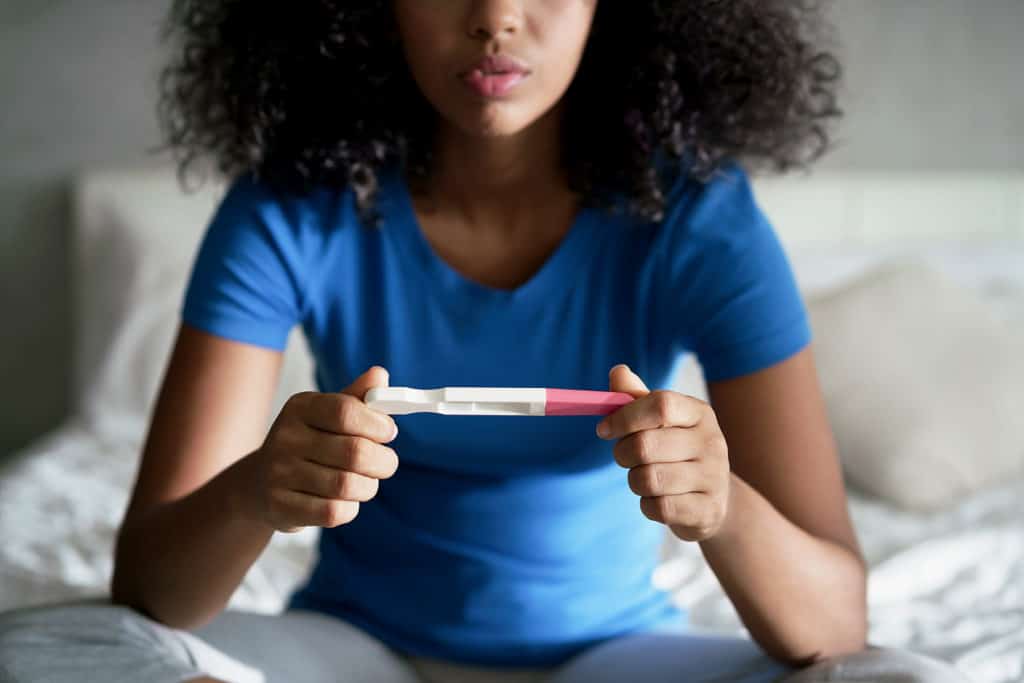
Table of Contents
The phenomenon of getting your period after a positive pregnancy test is known as a ‘chemical pregnancy’ and it is a common occurrence.
It is normal for some women to get periods after testing positive on the pee stick. If you are a woman who has been through this confusing scenario, you are not alone and there’s nothing to worry about. Let’s learn about chemical pregnancy today!
Have you been waiting to conceive your baby for over months already? Did you finally just test positive the past weekend? And then, in a turn of events, did you just see some spotting on your panty? Getting your periods after testing positive for pregnancy could be a terrifying, confusing situation to be in. However, in most cases, as long as the flow and other symptoms are just like any regular period you’ve had all along, there is nothing to worry about.
What is a Chemical Pregnancy?
A chemical pregnancy takes place when a pregnant woman happens to lose the baby after the egg has already fertilized but has not implanted in the uterus. Chemical pregnancy typically takes place within five weeks of conception. This extremely common phenomenon happens with as many as 40-50 percent of women, and most of them may not even realize they’ve experienced a chemical pregnancy if they had not tested themselves prior.
What are the symptoms of Chemical Pregnancy?
Some of the only common symptoms of a chemical pregnancy are-
- A late period
- Intense menstrual cramps
- Positive pregnancy tests followed by periods
- Heavy vaginal bleeding
Why does a Chemical Pregnancy take place?
In a normal pregnancy-
- A fertilized egg implants in the uterine wall of the mother, usually either around the fourth week or the first day after the last period
- In a normal pregnancy, the cells then transform into the placenta in order to be able to produce detectable levels of pregnancy hormone aka hCG (human chorionic gonadotropin).
In a chemical pregnancy, on the other hand-
- The implantation fails
- The cells fail to transform into an embryo and the placenta
- Hence, vaginal bleeding takes place a few days to a week after the due date of the regular period
Chemical pregnancy, most commonly, takes place due to chromosomal abnormalities. In a regular pregnancy, an egg and a sperm combine 23 chromosomes from each involved partner to form a zygote with a total of 46 chromosomes. This zygote then evolves into a blastocyst via rapid cell division and goes on to implant itself in the uterine wall.
In a chemical pregnancy, on the other hand, the sperm or the egg will either have too many or too few chromosomes that cause the resulting zygote to be formed of an abnormal number of chromosomes; i.e.a number less or more than the ideal 46. The abnormality does not let the resulting zygote develop as it should into a blastocyst. Hence, instead of implanting itself on the uterine wall, the fertilized discharges from the mother’s body in the form of a period.
Why does a chromosomal abnormality take place?
A chemical abnormality responsible for chemical pregnancies is rather a common occurrence and can randomly take place in any woman. The mother should not be held responsible. It should also be understood that a chemical pregnancy does not mean an inability of getting pregnant again in the future.
What factors increase the risk of Chemical Pregnancy?
Though chemical pregnancies can take place in any woman, there certainly are some risks that increase the chances of this occurrence. The risk factors that increase the chances of a chemical pregnancy include-
- Age: Women older than 35 are more likely to suffer a chemical pregnancy
- Underlying, untreated clotting or thyroid condition
- Diabetes
Implantation Bleeding v/s Chemical Pregnancy
At times, some women may notice vaginal blood discharge in the form of light spotting or stain-like bleeding after having tested positive for pregnancy. However, such light spotting, most likely, is not due to a chemical pregnancy and might instead be implantation bleeding.
If you have already tested positive for pregnancy, keep in mind that the symptom of a chemical pregnancy is heavy, menstrual-like bleeding, whereas, light spotting or stains can be associated with implantation bleeding.
Either way, regardless of the kind of bleeding you experience post confirming positive for pregnancy, it is always recommended to reach out to your health care provider to have yourself medically reviewed.
How to deal with Chemical Pregnancy?
A chemical pregnancy, unlike an early miscarriage, is described by doctors as a situation wherein pregnancy never took place, however, losing a baby in either form could be daunting, to say the least. If you have experienced a chemical pregnancy, regardless of how many women go through it or how common an experience it is, it is absolutely OK to feel devastated. Give yourself as much time you may need to deal with it.
However, all women need to remember that the early pregnancy loss as a result of chemical pregnancy occurs due to a chromosomal accident beyond anyone’s control. And hence, never beat yourself up for having gone through a chemical pregnancy. A chemical pregnancy does not diminish or affect the chances of future pregnancy whatsoever. It does not even, in fact, mean that you are prone to more chemical pregnancies in future conceptions. Look at it as a one-time accidental bruise- there is nothing to worry about once the wound heals!
Chemical pregnancy: Should I be worried? Final Conclusion:
Since chemical pregnancy is after all an early pregnancy loss, in most cases there is not a lot to worry about. Having said that, it is always a good idea to visit a doctor in order to be double-sure. It is also recommended to have yourself medically reviewed if your menstrual cycle lasts for more than 35 days or if you are experiencing irregular periods over a range of months. Such irregularity in menses may be associated with underlying conditions like PCOS (polycystic ovary syndrome) that causes anovulation (lack or absence of ovulation, that is, the release of the egg necessary for getting pregnant.
A chemical pregnancy is undeniably not a very good place to be in, but let us reassure you, this is not the end of the journey. You can still conceive a healthy baby for a healthy pregnancy soon again, here’s a tight virtual hug for you mamma!
Chemical Pregnancy FAQs:
1) Is a chemical pregnancy considered a miscarriage?
2) Why do they call it a chemical pregnancy?
3) What is a biochemical pregnancy?
4) Can a chemical pregnancy be saved?
Sources:
Reviewed By:

Esha Chainani - Obstetrician and Gynaecologist
Dr. Esha Chainani is an Obstetrician, Gynaecologist, and laparoscopic surgeon who aims to break the stigma around women’s health by advocating an inclusive and open practice of obstetrics and gynecology and an author of several internationally published research papers and health articles in the media like the Swaddle.
She also founded Premaa, a non-profit to reduce maternal morbidity and eventual maternal mortality by providing lower-income pregnant women living in urban areas with cell phone access through an app that can feature an entire section about contraception as well for a whole gamut of reproductive health.
A panel for multiple health sessions including with the UN, USAID, BMC, gender at work, and multiple non-profit organisations, and is on the advisory panel of the South Indian medical students association.




